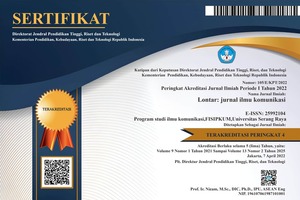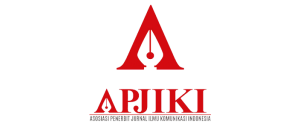KEKUASAAN PEMILIK MODAL DALAM STRUKTUR KAPITALISME MEDIA (Studi Ekonomi Politik Produksi Konten Surat Kabar Radar Banten)
DOI:
https://doi.org/10.30656/lontar.v4i2.332Abstract
Era globalisasi saat ini, media tidak lagi hanya menjadi mesin ideologi informasi yang memiliki spektrum tanggung jawab sosial dan partisipasi politis dalam mengritisi kebijakan-kebijakan penguasa. Tetapi media pun telah menjadi mesin pencetak uang dan modal, tak ubahnya seperti lembaga-lembaga bisnis yang lain. Ideologi bisnis bergerak koheren dengan ideologi politik, sosial-budaya, agama. Bahkan, tidak sedikit kasus kepentingan bisnis menjadi yang terdepan, sehingga menarik untuk ditelaah. Gerakan reformasi berhasil mendorong setidaknya dua perubahan yang signifikan Pertama, era kebebasan pers yang menggantikan tirania utoritatif Kedua, perubahan mendasar dari reformasi adalah agenda otonomi daerah yang mengusung asas desentralisasi. Media lokal dapat memainkan berbagai macam peran yang disesuaikan dengan tujuan pokok diberlakukannya desentralisasi. Kasus menarik yang terjadi pada media lokal tersebut. Kemunculan Harian Banten (sekarang Radar Banten) pada 2 juni 2000 di kelola PT Wahana Semesta Banten mengartikulasikan kebutuhan informasi masyarakat sekaligus mengisi ceruk pasar (market niche), dalam perjalanannya organisai media dan para pekerjanya dihadapkan banyaknya tekanan permasalahan kasus yang muncul, baik tekanan dari pemilik modal maupun tekanan dari ekternal lingkungan penguasa daerah. Hal tersebut peneliti tertarik untuk mengungkap dan menjelaskan Kekuasaan Pemilik Modal Dalam Struktur Kapitalisme Media pada proses produksi konten di surat kabar Radar Banten. Rumusan masalah dalam penelitian ini bagaimana kekuasaan pemilik modal dalam struktur kapitalisme media di surat kabar Radar Banten?, bagaimana kekuasaan pemilik modal dalam proses produksi konten headline, opini, iklan di Surat kabar Radar Banten. Penelitian ini menggunakan paradigma kritis pendekatan penelitain kualitatif deskriptif dengan menggunakan metode studi kasus, teori yang digunakan ekonomi politik media Goulding and Mourdok Informan utama merupakan General Manajer, Sumber data diperoleh dari wawancara, dan dokumentasi. Hasil penelitian ini mengungkap dan menjelaskan bagaimana kekuasaan pemilik modal dalam struktur kapitalisme media bekerja.Downloads
Published
Issue
Section
License
By submitting an article to the journal, the author(s) agree to transfer the published article's copyright to the journal, which will act as the publisher. This means the journal will have the right to publish the article in various forms, including reprints. The journal will maintain the publishing rights to the published articles.
In line with the license, authors and third parties (readers, researchers, and others) are allowed to share and adapt the material. In addition, the material must be given appropriate credit, provided with a link to the license, and indicated if changes were made. If authors remix, transform, or build upon the material, authors must distribute their contributions under the same license as the original.






